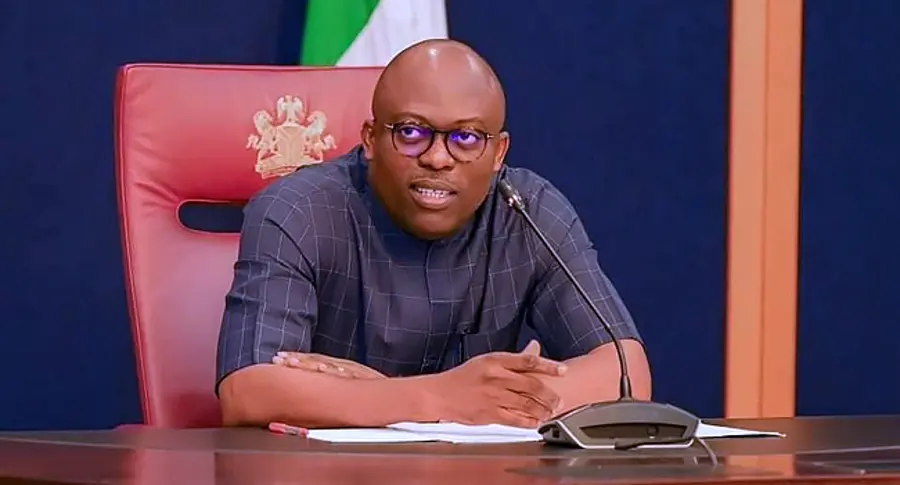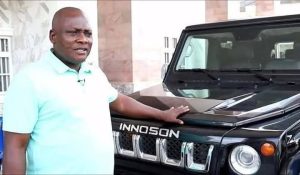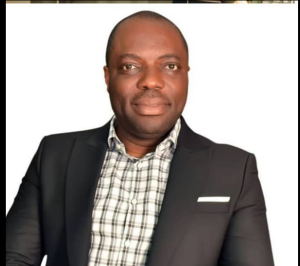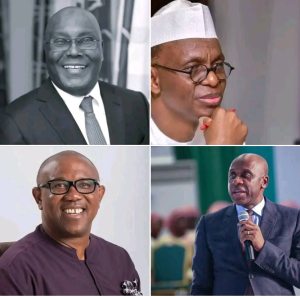Gov. Fubara Writes Rivers Assembly Again, Proposes Wednesday for 2025 Budget Presentation
Rivers State Governor, Siminalayi Fubara, has once again written to the Rivers State House of Assembly, proposing a new date for the presentation of the, Siminalayi Fubara, has once again written to the Rivers State House of Assembly, proposing a new date for the presentation of the 2025 state budget. In his letter to the Assembly, dated March 18, 2025, Governor Fubara suggested that March 19 at 11:00 a.m., or at any other time that the Assembly deems convenient, be chosen as the date for the official presentation of the budget. The letter was addressed to the Speaker of the Assembly, Rt. Hon. Martin Amaewhule.
This communication from the governor marks the latest development in an ongoing political saga, the roots of which are deeply embedded in the complex dynamics between the executive and legislative branches of the Rivers State government. It follows an earlier attempt by Governor Fubara to present the budget on March 12, 2025, which was thwarted after he was denied entry into the Assembly’s premises by security personnel. This event attracted significant media attention and intensified public scrutiny of the relationship between the governor and the state legislature.
The failure of the governor’s initial budget presentation was seen as a symbolic action reflecting the deepening rift between the executive and legislative arms of government, despite both branches being under the control of the same political party. The denial of entry into the Assembly was not only a dramatic moment in the ongoing political tensions but also set the stage for the latest correspondence from Governor Fubara to the Assembly.
In his letter to the Speaker, Governor Fubara referenced the Supreme Court judgment that had played a pivotal role in shaping his previous attempt to present the budget. The judgment, which the governor referred to in his letter, was a landmark ruling that reaffirmed the constitutional duties of the governor in presenting the state’s budget. The Supreme Court had ruled that the governor’s role in proposing the state budget was within his constitutional rights and mandated the Rivers State House of Assembly to fulfill its legislative duties within the bounds of the law.
Governor Fubara reiterated that his March 12 budget presentation was an attempt to comply with the court’s decision and fulfill his obligations under the Nigerian Constitution. He pointed out that the Supreme Court judgment not only clarified his legal right to present the budget but also required the Assembly to carry out its constitutional functions, which include reviewing and approving the state’s budget within the framework of the law. The court’s ruling highlighted the necessity of collaboration between the executive and legislative branches, reminding both sides of their legal and constitutional obligations.
The governor’s insistence on complying with the Supreme Court judgment serves as an indication of his commitment to ensuring that his actions as the chief executive are firmly grounded in legal principles. His appeal to the Assembly to adhere to the judgment underlined the importance of upholding the rule of law in all government processes. This reference to the Supreme Court’s ruling is not only a legal matter but also a political statement, signaling to the Assembly that their actions must fall within the constraints of constitutional governance.
The ongoing tensions between the executive and legislative branches of the Rivers State government have dominated the political landscape in recent weeks. Political observers have pointed out that the denial of entry into the Assembly on March 12 was symbolic of a broader power struggle between the two arms of government. While both branches belong to the same political party, the People’s Democratic Party (PDP), differences in governance priorities and individual ambitions have contributed to a fractious relationship.
Governor Fubara’s frustration with the Assembly’s actions is evident, particularly in his comments about the timing of the 48-hour ultimatum that the House had earlier issued for the presentation of the budget. In his letter, he indicated that the Assembly had acted prematurely, demanding the budget presentation even before he had been served with a certified true copy of the Supreme Court judgment or its enrolled orders. This sequence of events raised questions about the Assembly’s motives and its interpretation of the court’s ruling.
Some critics of the Assembly’s actions argue that the legislators were using procedural tactics to delay the budget presentation, thereby undermining the governor’s ability to deliver on his promises to the people of Rivers State. This perceived obstructionism has fueled speculation about underlying political rivalries within the state’s PDP establishment. The inability of the executive and legislative arms to come to terms on key governance matters such as the budget presentation has caused concern about the potential for political instability in Rivers State.
The current situation is reminiscent of previous political standoffs between governors and state assemblies in Nigeria, where differences between the two branches often spill over into public view, affecting the governance process. Such conflicts are typically framed as struggles for control, with each side seeking to assert its authority and influence over the direction of state policy.
The 2025 budget is a crucial document for the people of Rivers State, as it outlines the government’s financial priorities and plans for the coming year. The budget is expected to allocate funds for key sectors, including infrastructure development, healthcare, education, social welfare, and security. The governor’s ability to secure the timely passage of the budget is central to his administration’s ability to implement its developmental agenda and address pressing issues facing the state.
For Governor Fubara, the 2025 budget is a defining document of his administration, representing his vision for the future of Rivers State. However, the ongoing political wrangling has raised doubts about the Assembly’s willingness to cooperate in approving the budget in a timely manner. Any further delays in the passage of the budget could impede the governor’s ability to deliver on critical development projects, including those related to transportation, healthcare infrastructure, and the education sector.
The proposed allocation for infrastructure development is particularly important, as the governor’s administration has pledged to focus on improving road networks, expanding energy access, and increasing the state’s capacity to generate revenue. These projects, if executed successfully, could significantly enhance the quality of life for Rivers State citizens and attract further investment into the region. However, any disruptions to the budget process could result in stunted development and lost opportunities for economic growth.
In addition to the fiscal impact, the political implications of the budget process are also significant. The successful passage of the budget would be a key victory for Governor Fubara, signaling his ability to navigate political challenges and maintain control over the direction of state governance. On the other hand, further delays or opposition to the budget could signal weakness in the executive’s authority, potentially eroding public confidence in the governor’s leadership.
In his letter to the Speaker, Governor Fubara made a heartfelt appeal for unity and cooperation among all arms of government. He stressed the importance of working within legal and constitutional frameworks, with the ultimate goal being the betterment of the people of Rivers State. The governor expressed the belief that no matter how deep the political differences between the executive and the legislature may be, the interests of the people should always take precedence.
This appeal for unity is a significant aspect of Governor Fubara’s leadership style. Throughout his tenure, he has emphasized the need for all branches of government to collaborate for the common good. His recent remarks reflect a desire to de-escalate tensions and focus on the issues that matter most to Rivers State’s citizens, rather than allowing personal or political animosities to overshadow the work of governance.
By invoking the principle of putting the people first, the governor is attempting to reframe the debate away from the political infighting and towards the more important task of serving the public. His statement is a reminder that the executive and legislative branches, while distinct in their functions, share the common responsibility of ensuring the well-being of the people they serve. If both branches can move beyond their differences and work together, they have the potential to achieve significant progress for Rivers State.
The outcome of this ongoing budget drama will likely have lasting implications for the political landscape of Rivers State. Should the budget presentation proceed smoothly on March 19, it could represent a turning point in the relationship between the executive and the legislature, signaling a new era of cooperation and collaboration. Such an outcome would likely enhance Governor Fubara’s standing within the party and among the public, as it would demonstrate his ability to overcome political challenges and deliver on his promises.
On the other hand, any further disruptions or delays in the budget process could have negative consequences for both the governor’s political fortunes and the state’s development. Prolonged standoffs between the executive and legislative branches could lead to a loss of public trust in the political system, as citizens may begin to view the government as ineffective and incapable of meeting their needs.
In addition, the uncertainty surrounding the budget process could discourage potential investors from committing to projects in Rivers State, further hampering the state’s economic growth. Stability in governance is a key factor in attracting investment, and any perceived instability could result in missed opportunities for development.
The political dynamics in Rivers State are complex and multifaceted, and the outcome of this budget presentation saga will likely shape the future of governance in the state. If the executive and legislature can find common ground, they have the opportunity to set a positive example for other states in Nigeria, demonstrating that political differences need not impede the progress of government and the advancement of public interests.
Governor Siminalayi Fubara’s latest letter to the Rivers State House of Assembly is a significant development in the ongoing political drama surrounding the 2025 budget presentation. The governor’s insistence on complying with legal frameworks and his call for unity among government institutions reflect his commitment to constitutional governance and his desire to move past political differences for the benefit of the people of Rivers State.
As the date for the proposed budget presentation approaches, all eyes will be on the relationship between the executive and legislative branches. Whether the budget is presented successfully on March 19, or if further disruptions occur, the outcome will have far-reaching consequences for the future of governance in Rivers State. The citizens of the state are keenly watching these developments, as the efficiency of the budget process will have a direct impact on the state’s future prosperity and stability.
The next few days will be critical for Governor Fubara, the Rivers State House of Assembly, and the people of Rivers State. Whatever the outcome, it will undoubtedly be a defining moment in the political history of the state, shaping the trajectory of governance and political cooperation for years to come.





